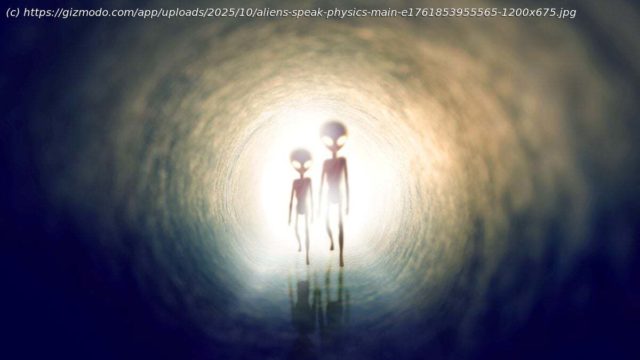Daniel Whiteson and Andy Warner’s upcoming book is a philosophical exploration of the humanity behind our desire to find aliens.
At Gizmodo, we love a good story about aliens—especially if it gives us a headache. Personally, I reward extra points for bonus dad jokes.
Daniel Whiteson and Andy Warner’s upcoming book, Do Aliens Speak Physics? And Other Questions about Science and the Nature of Reality presents the best combination of all these things. The book imagines what it would be like to discuss physics with aliens, drawing from a diverse array of experts in the history and philosophy of science—accompanied by Warner’s delightful illustrations plus physics puns and hypothetical donuts.
Co-author Daniel Whiteson is a particle physicist at CERN and the University of California, Irvine, as well as a science communicator and host of the podcast Daniel and Kelly’s Extraordinary Universe. Gizmodo spoke to Whiteson about the philosophical nature of the search for aliens and what it reveals about our own humanity. The following conversation has been lightly edited for grammar and clarity.
Gayoung Lee, Gizmodo: Okay, so, do aliens speak physics? What is this question even asking?
Daniel Whiteson: I don’t know if aliens speak physics! That’s why I wrote this book, to argue both sides of this question. I feel like a lot of physicists assume that the physics we are doing is universal… that the way we’re doing things and our way of life is the only way.
I wanted to push back on that a little bit and explore and make the opposite argument and suggest that there might be a lot of humanity in the physics that we’re doing—the way we think about it, the questions we’re asking, the answers we accept, and our path into physics.
Gizmodo: At the very start of your book, you introduce an extended version of something called the Drake equation. What is it, and how have you reimagined it?
Whiteson: The Drake equation is a fun way to organize your thoughts about whether there are other intelligent civilizations in the galaxy. There have to be stars or planets for them, life that evolved to develop sentience and technology, and they have to do it all roughly within a time window that we can communicate with them.
It breaks these features apart because they are separate issues. It emphasizes something really crucial: you’ve got to have all the pieces to work. If any of those numbers go to zero, you’re out of luck.
But in the book, we’re not just interested in intelligent aliens. We want to find intelligent aliens that do science the way that we do so we can learn from them. Otherwise, it’s just too big a space to explore, and all those things must come together for this intergalactic science conference that is my personal fantasy.
Gizmodo: Okay, so let’s unpack some of these additions. The first one is about whether aliens do science at all.
Whiteson: Sure. This was tricky to tackle. I think a lot of people assume that if aliens arrive, they’re technological—because they’ve gotten here. They have some way to cross the vast distances between the stars, so they must have a scientific understanding of how they did that.






